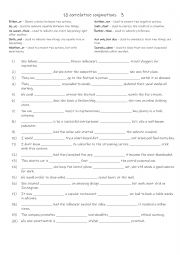
|
10 correlative conjunctions 3
First, students need to familiarise themselves with the 10 conjunctions and their meanings. Then they read the sentences to see which one is required to complete the gap-fill. Each linker is used 2 times! Answers on page 2.
Level: intermediate
Age: 9-100
Type:
Downloads: 120
|
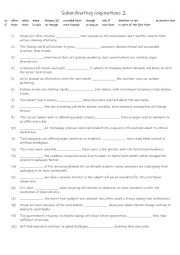
|
B1-C1 20 subordinating conjunctions 2
First, students need to familiarise themselves with the 20 subordinating conjunctions and their meanings. Then they read the sentences to see which one is needed to complete the sentence. Answers on page 2
Level: intermediate
Age: 10-100
Type:
Downloads: 124
|
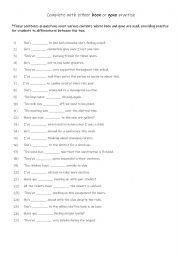
|
Complete with either been or gone practise
These sentences & questions cover various contexts where been and gone are used, providing practise for students to differentiate between the two. Students read the 27 sentences and questions to decide if the gap-fill exercise needs either been or gone to complete it. This worksheet is suitable for A2-B1 students. Answers on page 2.
Level: elementary
Age: 8-100
Type:
Downloads: 117
|
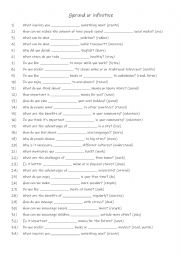
|
B1-B2 Gerund or infinitive practise
Students read the sentences and complete them with either the gerund or infinitive form. Answers on page 2.
Level: intermediate
Age: 10-100
Type:
Downloads: 120
|
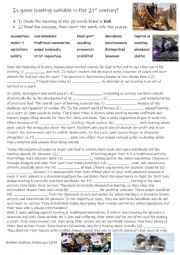
|
Why do people still kill exotic and defenseless animals?
500-Word reading article with a 20-word gap fill exercise about why people still hunt animals for both food and for sport. It takes an deeper look at the reasons for and against hunting .This sheet is suitable for higher level A2 to B1 students of all ages. An answer sheet is included. For higher level students they could be put in groups to give /...
Level: elementary
Age: 12-100
Type: worksheet
Downloads: 1855
|
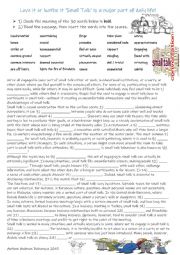
|
Love it or loathe it �Small Talk� is a major part of daily life!
800-Word reading article with a 30-word gap fill exercise about why people use small talk on a regular basis. It takes an deeper look at the reasons why people feel the need to chat to strangers; the benefits, what topics are suitable and those which are taboo.This sheet is suitable for higher level B1 to C1 students of all ages. An answer sheet is...
Level: intermediate
Age: 12-100
Type: worksheet
Downloads: 2081
|
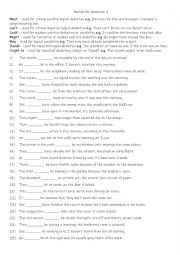
|
A2-B1 7 modals for deduction 2
First, students need to familiarise themselves with the modals and their use. Then they read the sentences to see which one is needed to complete the gap-fill. Each modal is used 4 times! Answers on page 2.
Level: elementary
Age: 9-100
Type:
Downloads: 113
|
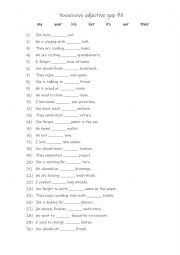
|
Possessive adjective gap fill practise
Students read the sentences and identify the subject to see which possessive adjective is required to complete each sentence. Suitable for A1-A2 level students.Answers on page 2
Level: elementary
Age: 9-100
Type:
Downloads: 101
|
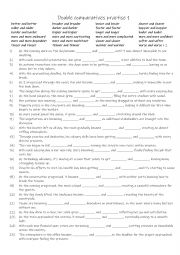
|
B1+-B2 25 double comparatives - Part 1
Double comparatives are used to describe a situation where something increases or decreases progressively. By repeating the comparative form, we emphasise how the quality or action becomes more extreme. This structure is common in English, and learning it can help express change in a dynamic and descriptive way. Native speakers use double comparati...
Level: intermediate
Age: 10-100
Type:
Downloads: 108
|
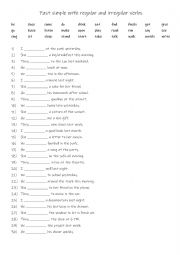
|
A1 Past simple regular & irregular verbs
Students read the sentences and use one of the given infinitives in bold to complete the gap-fill. Answers on page 2
Level: elementary
Age: 8-100
Type:
Downloads: 111
|












